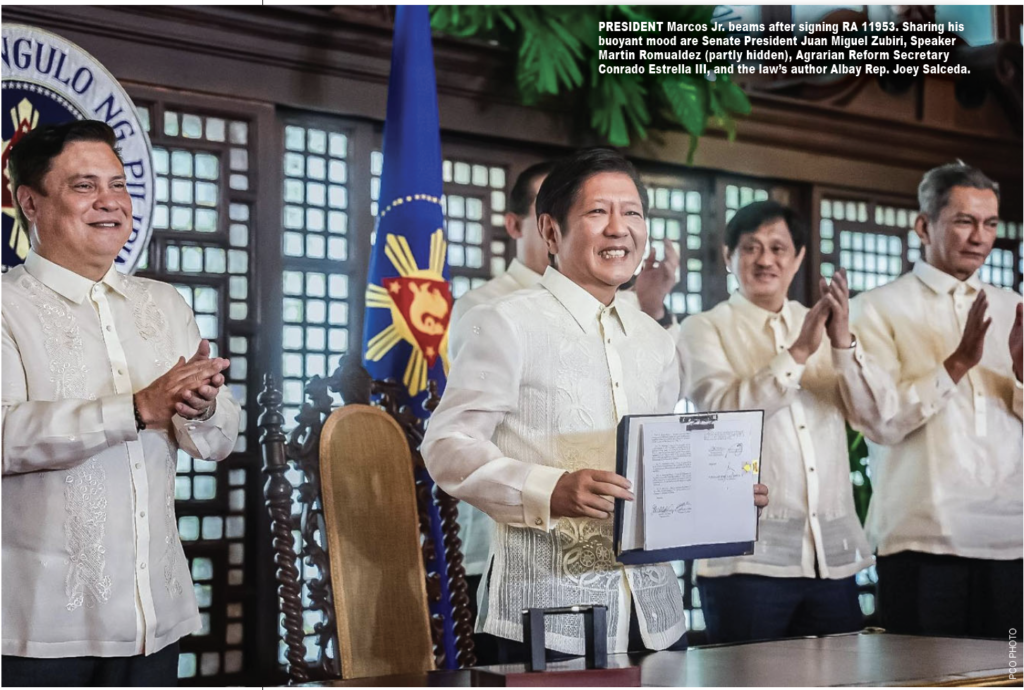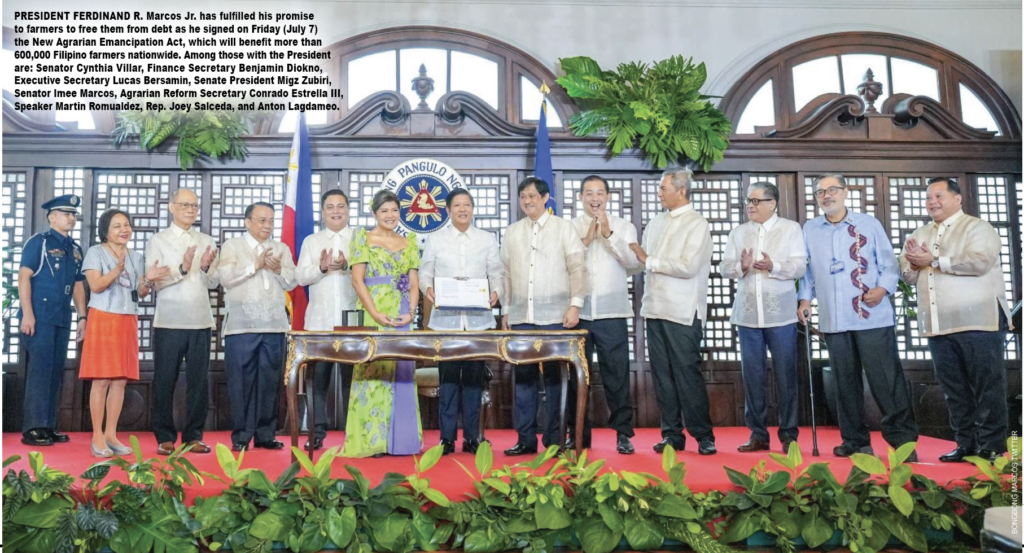By Tony Lopez
Perhaps, the best economic reform so far by President Ferdinand Romualdez Marcos Jr. is the law that condones the P58 billion debts of some 654,000 agrarian reform farmers to the government.
Marcos Jr. on Friday (July 7) signed the law that forgets over P58 billion worth of loans of 654,000 farmers who are agrarian reform beneficiaries (ARBs).
Republic Act (RA) 11953 writes off “all principal loans, unpaid amortization and interests, and exempting payment of estate tax on agricultural lands awarded under the Comprehensive Agrarian Reform Program.”
The farmers include those who on Oct. 21, 1972 were declared emancipated by President Ferdinand Edralin Marcos Sr. when he signed PD 27, the Agrarian Reform Act. PD 27 gave farmers the land they were tilling for centuries but they must pay for it at concessional terms, for 30 years. Alas, they could not pay for it.

RA 11953 condones all loans, including interests, penalties and surcharges that covered the land awarded to ARBs under PD 27, RA 6657 (the Comprehensive Agrarian Reform Law of 1988), and RA 9700 which extends the acquisition and distribution of agricultural lands under the Comprehensive Agrarian Reform Program (CARP) of President Corazon Aquino.
Albay 2nd District Rep. Joey Salceda shepherded the agrarian debt condonation bill thru Congress, a house of oligarchs and landowners. Since the presidency of Gloria Macapagal Arroyo, where Joey served briefly as a cabinet member, he had been advocating for debt amnesia for farmers.
Also, the government will assume the P206 million owed by 10,201 ARBs tilling 11,531.24 ha of land as compensation for landowners under the Voluntary Land Transfer or the Direct Payment Scheme.
Under RA 11953, the ARBs will be included in the Registry System for Basic Sectors in Agriculture of the Department of Agriculture (DA). Inclusion entitles them to all support services given to farmers by the DA and other government agencies.

BBM was naturally in his best mood while signing RA 11953.
“Pinangako ko sa ating mga kababayan na itutuloy ang (I promised our countrymen that we will continue the) Agrarian Reform Program. I’m here today to build on that promise because our beneficiaries deserve nothing less. Ituloy natin ang repormang agraryo (Let us continue the agrarian reform),” he exulted.
Genuine emancipation, he said, required more than just land distribution. The handing titles to ARBs was just the first step toward more sustainable farms and higher income for farmers. He also pledged to speed up the resolution of agrarian cases.
The President pledged to revitalize the agricultural sector by training a new generation of young farmers “who will become the driving force behind a modernized and profitable agriculture sector that fuels sustainable rural development.”
“It is time to give our farmers the recognition that they deserve as the providers of our nation’s sustenance, the providers of life to all of Filipinos,” said Marcos.
“It was my father’s dream to give every Filipino farmer and his or her family, a life beyond mere survival, a life free from hunger or fear of the future,” the President recalled.
“Freeing our farmers from debt through the passage of the New Agrarian Emancipation Act today is the first concrete step towards fulfilling the vision that our late father, President Ferdinand Edralin Marcos, enunciated more than 50 years ago, when he signed Presidential Decree (PD) 27 decreeing the ‘emancipation of tenants from the bondage of the soil’,’’ said the President’s sister, Senator Imee Marcos. She authored RA 11953 in the Senate.
More than the amount involved (P58 billion) and the total farm land involved (over one million hectares), this debt amnesia is symbolic in many ways:
One, it shows the government cares—for the poorest of the poor (our farmers) and for the greatest number, us food consumers.
The P58 billion is a drop in the bucket in the government budget.
The national government has a 2023 budget of P5,268 billion. So P58 billion is just one peso for every 100 pesos of government expenditure for 2023. The impact of that one peso will be permanent and lasting. We will now have more and cheaper food.
Each senator collects P200 million in pork barrel. That’s P4.8 billion.

Each congressman gets P70-million pork. So 316 times P70 million is P22.1 billion—38.5% of the P58 billion debts of 654,000 farmers forgiven.
P58 billion divided by 654,000 yields just P88,685 per farmer debt, or $1,600 in dollar terms.
Farmers on average own 1.8 hectares of land, not a viable size for farming these days of high cost of farming inputs like fertilizer and seedlings.
Two, debt condonation is the real emancipation. Government routinely forgets the monumental debts of its cronies. So why not farmers.Three, the P58-billion completes the cycle of emancipation of farmers under two Marcos regimes, after more than half a century (51 years, between 1972 and 2023).
Four, with RA 11953, the government should finally get serious with the food production business, currently dismal.
Food is 50% of an average household’s expenses; the poor spend more for their food, 55%. Of the 50 percentage points of the Consumer Price Index, rice is 15 points. For every P100 of household money, P15 goes to rice, alone. Alcohol is P2.
Utilities (rent, water, electricity, gas and other fuels) are P22.47 of every P100 of consumer money.
Food is the No. 1 expense item of the people. Yet, the farmers get little if any of that demand, despite working body and soul to produce the food.
The land developers, the telcos and the power and energy companies get the bulk of consumer money, 22.5%. No wonder they are our richest billionaires.
Man can live without housing, without electricity, without cellphones, and even without clothes. But not without food.
